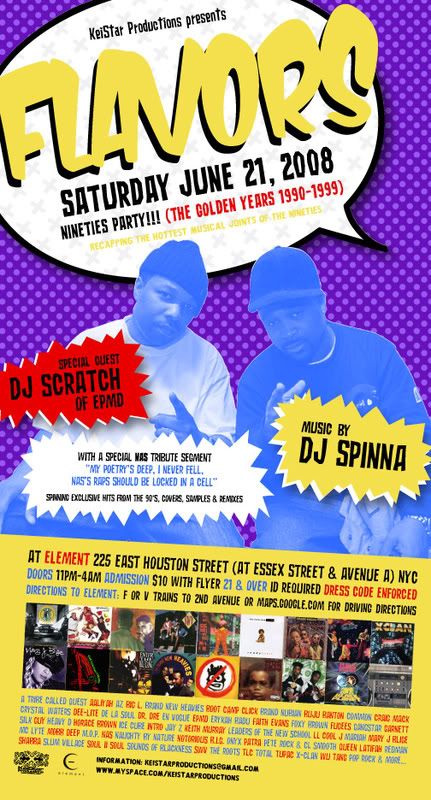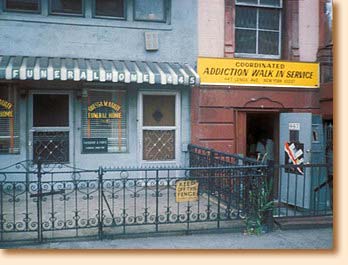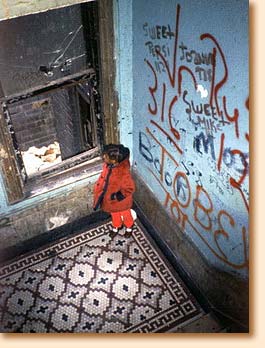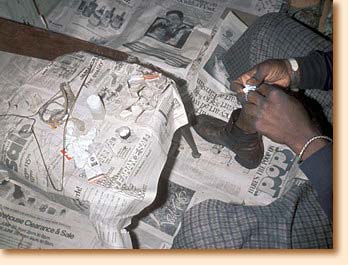
 Last month, when I read Weiss's post titled “Passion of the
Last month, when I read Weiss's post titled “Passion of the
Weiss's Guide to the Gay Rapper" I thought about both, what
men in general and white men specifically have invested in
monitoring the Black gayness in hip hop. Weiss's post was in
response the Terrence Deans new book, Hiding in Hip Hop.
I then decided that I was going to write about the book as well.
I have written about Black men and homophobia here before,
so it seemed like a natural extension to discuss the book.
Initially, after reading the book, I was disappointed.
I was expecting to hear him, a gay man, provide an insiders
view of the hip hop industry from his perspective.
What I found instead was a book with gay blind items.
However, there was one thing in particular that stood out to me.
He mentioned how upon visiting the Queens Bridge projects,
that he dare not think about looking at another man.
Or risk getting beat down.
I thought to myself, how differently my own life would be
if I couldn’t flirt with the male barista at my favorite coffee shop
where I like to blog, or greet the police officer in the train station,
or wink at the afro-mohawked hipster riding his Schwinn
down Fulton Ave.
I would be essentially robbed of my ability to express
a fundamental part of both my humanity and femininity.
I knew I needed to write about Dean's book, but I also
needed more theory.
With this in mind I read Keith Boykin's book Beyond the
Down Low.
While reading Boykin's book, I realized that this post
was morphing from one that was initially about hip hop,
homophobia and masculinity to one about the down low,
HIV statistics and the impact of taking sexual risks.In Beyond the Down Low Boykin addresses the seeds
of "down low mania" by discussing a broad survey of articles,
CDC studies and statements by health professionals. Perhaps most
surprisingly he addresses the apparent lucrative
financial incentives associated with writing about the salaciousness
of a story about Black, gay and implicitly predatorial sex.
Historically the mainstream media has paid very little attention
to the Black HIV statistics. This all changed when the CDC
published The Young Mens Health Survey in 2001.
The problem is that the news reported that 30 percent of Black Gay
men were HIV positive.
However the study was based on 2,401 men, who have sex with
men (MSM) from in six cities. 293 (12%), of the men tested positive
for HIV.
Here is the rub, 30% of the Black men in the study tested positive for
HIV. Keep in mind that the study did not solely consist of Black men.
Boykin clarifies what went wrong with how the story was reported
when he writes,
"Take the USA Today article for example. That paper claimed 1 in 3 young gay
black men are HIV positive. The CDC never really said that. Instead what they said was 30 percent of Black gay men in the survey of those six cities were HIV positive. Its important to understand the distinction between those six cities and the rest of the nation." Emphasis mine.
The study also didn't report the number of men in the study who were
Black. It could have been 4, 10 or 20 making a change in 1 or 2 cases
statistically significant.
Another CDC study concluded that 54% of women newly reported with AIDS
reported that they acquired the virus from heterosexual relationships.
The study suggests states that "The proportion of infected females was
highest among persons aged 13--19 years". According to the survey, the
data suggests that,
...females in this age group engage in behaviors that place them at increased risk for acquiring HIV infections; the high proportion of infected females might be associated with sexual contact with older males, who are more likely to be infected. In addition, young females might have more opportunities for HIV testing and diagnosis (e.g., routine family planning and gynecological services) than young males.
The issue may be one of testing and reporting meaning that
there may not necessarily be more young Black women with
HIV than men, it may be that they simply get tested more
frequently.
Both the media, activists and the folks involved in the HIV research
wanted to know why so many Black women were being diagnosed
with HIV.This is where the down low came in as an easy explanation.
There are two prongs to his argument that the down low isn't
responsible for an increase in the number of Black women with
AIDS.
The first prong is that,
"because the number AIDS cases among black men (24,118) reported homosexual contact as a method of exposure. IN 2001 , the figure dropped 33 percent (4605)...The number and percentage of Black men expose to AIDS because of homosexual contact had declined sharply over that decade".
He goes on to say that this is important because,
"those men were the primary potential source of down low infections in 1991, there should have been fewer black women becoming infected as well. In other words the bridge should have been much wider in 1991 when there were five times as many black MSM AIDS cases than in 2001".
The second prong is that according to the CDC, The number of
Black women with HIV dropped from 1991-2001. Boykin writes,
"The number of of Black female AIDS cases from heterosexual
contact did not rise form 1991 to 2001. It actually fell. In 1991
there were 3784 adult adolescent black female AIDS cases
from heterosexual contact. In 2001, the number had fallen
to 2,606, a reduction of 1178 cases per year."
Boykin's rationale is that, if there were fewer HIV positive men in
1991 than 2001 who reported homosexual contact, and bisexual men
were the bridge, then it follows logically that then Black female AIDS
cases should have been decreasing. And, in fact they were from 3784 to 2606.
What I will note, is that Boykin's argument presumes that the HIV positive
men reporting homosexual contact takes into consideration that there
wasn't a statistically significant number of homosexual sex as a
method of exposure, but did not report it as such. Meaning that
he presumed that the only the folks who listed homosexual sex
as a method of exposure were the only ones who had such exposure.
The third prong is that there was a series of things that needed to
be addressed and proven before before a "bisexual" bridge link
could be made. Of the issues, the three major ones where whether
the Black women infected were being infected by heterosexual sex,
not injection drug use, second, that the women were being infected
by Black men not men of other races, and third that the men
MSM who identified as heterosexual were actually having sex
with women.
The main thrust of the down low frenzy was why are young
Black women the fastest growning group of new HIV cases?
The down low became the easy answer. This is where J.L. King
came in.
J.L. KING AND THE DOWN LOW
J.L. King, author of On the Down Low: A Journey into the Lives of
Straight Black Men who Sleep with Men cavalierly makes statements that
lend themselves to supporting the notion of their being a bisexual
bridge from Black men to Black women via hetrosexual sex.
For example In Beyond the Down Low Boykin deftly points out the
Kings unsupported theories when he quotes King speaking
about "most" down low brothers. He writes,
“Most down low brothers look at themselves as being a heterosexual man- with a twist every now and then wanting to have sex with another man. To a downlow brother sex is more gratification and not orientation. Its about lets get together and do the sexual thing, then I’m outta here. Don’t ask me any questions whatsoever. That’s what makes it so dangerous."
Boykin responds to the unproven assertions in the above statement.
He writing,
“...filled with generalizations and unprovable assertions. Most down low brothers? How did King know what most down low brothers wanted to do? Had he met all the men on the down low? Had he done a survey or a poll? How could he possibly know what most of these men thought, epically if they prided themselves on maintain to their secrecy and privacy. It was a ridiculous claim but no one challenged him on it. He was the only one who as actually speaking from the perspective of the down low so reporters listen uncritically to what he said. But how did ones individuals personal experience become a basis for cultural obsession.”
DOWN LOW DETECTIVES
Boykin is clear about how we must prevent HIV from being
transmitted in our communities. Becoming down low detectives
will not reduce our HIV rates. Assuming that everyone has HIV and insisting
that your sexual partner(s) wears a condom every time
is the only way to prevent transmission of HIV. This is a much
more proactive way of dealing with the issue rather than becoming a
down low detective.
Boykin drives them message home when he writes,
“Deputizing yourself as a down low detective will not make your man heterosexual if he is not, and it will not save your relationship if it is built on mutual mistrust. You can spend the rest of your life going to down low seminars and reading the latest magazine articles on how to tell if your man is gay, the truth is that there is no way to tell. There are no real “signs” to spot a man on the down low, and there are no real “behavior types” of these men. Despite the contradictory messages in his book. King himself admits that men on the down low do not look a certain way or act a certain way".
The directness with which he writes is both productive, insightful
lightweight revolutionary. He sets forth a healthy position that
black women must take if we choose to protect ourselves. He goes
on to say,
“ If you don’t want to be infected with HIV, then you have the responsibility to protect yourself. Nobody else can do that for you. The best way to know the truth. The best way to the the truth is not to spy on your partner but to create and environment where sexuality can be discussed openly. The truth is, you cannot tell if a man is on the down low, and you should never trust anyone who says that they can.”
INCREDIBLE HUSTLE
J.L. King's hustle is quite ingenious. By appointing himself
as the spokesperson for a group of people who by their
very definition would prefer to remain unidentified and'
invisible he stands to make himself incredibly rich off
of the Fear of a Black DL Planet.
Its as if J.L. King is Bush and the Black men on the DL are
(a collective) Willie Horton.
CONDOMS
Reducing the transmission of HIV will require us to be honest
with ourselves. I was reminded of this when Boykin quoted a
small 2004 study by Lisa Bowleg, a psychology professor at
the University of Rhode Island, which found that young Black
women had a range of reasons for using and not using
condoms. He writes,
“At least one woman said she used condoms as punishment, mostly on days when she thought her man was with another woman. Some simply did not like the feeling of condoms during sex….Some stopped using condoms after they got tested for HIV, which some wanted to use condoms at the beginning of the relationship but not through out…Our approach to HIV prevention has to go beyond the stereotype that men alone reject condoms and understand that many women do not like condoms either.”
We need to acknowledge these factors and effective HIV prevention needs
to acknowledge them as well, for the purposes of enacting policies
that reflect this reality.
However, we also have to take responsibility for our sexual risks. For example,
there was a woman in Bowleg's study who took the incredibly dangerous
position the don’t ask don’t tell stance in her relationship.
Boykin writes,
“She suspected that her partner of eight years was having unprotected sex with men and women, but was willing to tolerate it- as long as he just don’t flaunt it in my face…and don’t give me no sexual diseases or anything."
Boykin goes on to state that this position is dangerous precisely
because if you wait until your man brings home a sexually
transmitted disease before you question his infidelity, you
may be putting your health at risk.
We are all adults, and we have all made indecisions that, if given the chance,
we would have made another choice. That being said, while writing this
portion of the essay I thought about some of the sexual risks that I have
taken, and some of the risks that my male and female friends have taken
as well, such not immediately stopping after the condom broke or
having sex while intoxicated.
Condoms break. It happens. It can be terrifying. However, it only requires
stopping and replacing the condom. Having sex while intoxicated is
another ball game. By doing so am I clearly put myself in
the position of making decisions about sexual risks without
having the full advantage of my mental faculties. In many ways it
amounts to sexual Russian Roulette. Now that I am older, and have
a more astute understanding of risks and the outcomes, I deliberately
make effort to avoid putting myself in a position where I am facing
sexual Russian Roulette.
We are adults. At some point or another we all have done it.
Subsequently, my stance is that admitting it, moving on and deciding
to make healthy sexual choices going forward is the way to avoid
repeating these mistakes.
This kind of thinking and behavior will be what stops
the transmission of HIV in our communities. Not becoming
down low detectives.
Boykin dishes a dosage of straight talk about Black women who are
aware that their partners are sleeping with other women. He writes,“Lets be honest. Some women enter in relationship were they know their partner is sleeping with other women, that is a choice for women to make, but if you make that choice and also choose to have unprotected sex with your partner you are putting yourself in danger. You cannot blame your partner for a risk you knowingly accept. And you cannot and should not assume that it is safe to have protected sex with your man just because you know, or think you know that the is heterosexual. Women need to be educated, empowered and encouraged to stand up for themselves. Pointing fingers at men on the down low is an easy way to take the finger of responsibility away form ourselves, it also does not change the fact that we are individually responsible for our own health and safety.”
Some Black women are understandably enraged by bisexual Black men
who do not tell us that they are bisexual. We deserve the truth. However,
not only do we need them to be honest with us and we also have to
be honest with ourselves. The issue isn't the kind of sex being had,
its whether or not it is protected sex. The action NOT the label is what
matters. Boykin address the some of the conditions
that create a need to be on the down low when he writes,
“We may wonder where these men get off by endangering the lives of women, but we should also stop to think about the was in which we contribute to our own oppression by participating in a culture that drives these men underground. If we do not want so many men to be on the down low then we need to stop helping to push them there in the first place. We need to challenge the homophobia in our own lives, in our families, in our churches, and our social settings."
Only our actions can reduce the transmittal of HIV in our communities.
Healthy sexual choices, honesty and communication are all tools
that we can use.













